Center for Health Equity Newsletter
November 2021

In this newsletter:
Greetings from the Center for Health Equity
Message from the Director
CONNECT: Eliminating Health Disparities Initiative Grantees virtually connect at Fall Gathering
STRENGTHEN: Uniting Against COVID-19: A Unique Public Housing Collaboration for Vaccinating Community
AMPLIFY: Phyllis Wheatley: A cornerstone for COVID-19 support in the community
Greetings from the Center for Health Equity
In the past months, the Center for Health Equity has welcomed three new staff members!
We are thrilled to welcome our new director, Dr. Halkeno Tura. Read the Message from the Director to hear more about his first month. Dr. Tura joins us with over 15 years of experience in managing public health programs in the U.S. and abroad. He has extensive experience in implementing and managing health equity initiatives and mobilizing stakeholders, and he values investing in building a sense of belonging in community. Welcome Dr. Tura!
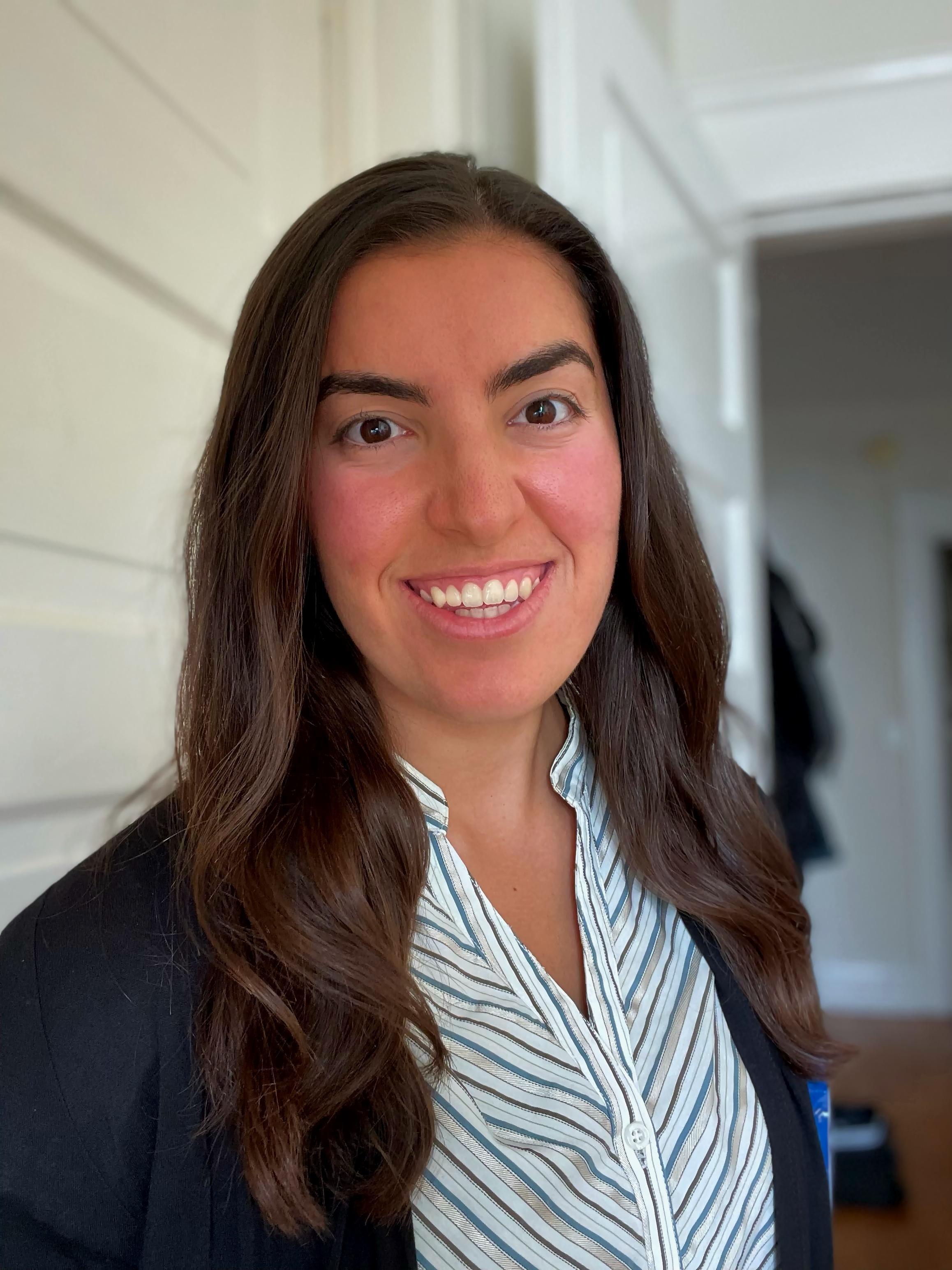
Carly Lovallo joined the Center for Health Equity through the CDC’s Public Health Associate Program in the fall of 2021. She completed a year of service with the National Health Corps Florida AmeriCorps Program in Jacksonville, Florida where she managed a pilot program at the YMCA for seniors at risk for social isolation and loneliness. Prior to her AmeriCorps experience, Carly graduated from James Madison University where she studied public health education and health communication. Carly has been supporting our COVID Community Coordinators initiative and our Community Solutions grant. Welcome Carly!
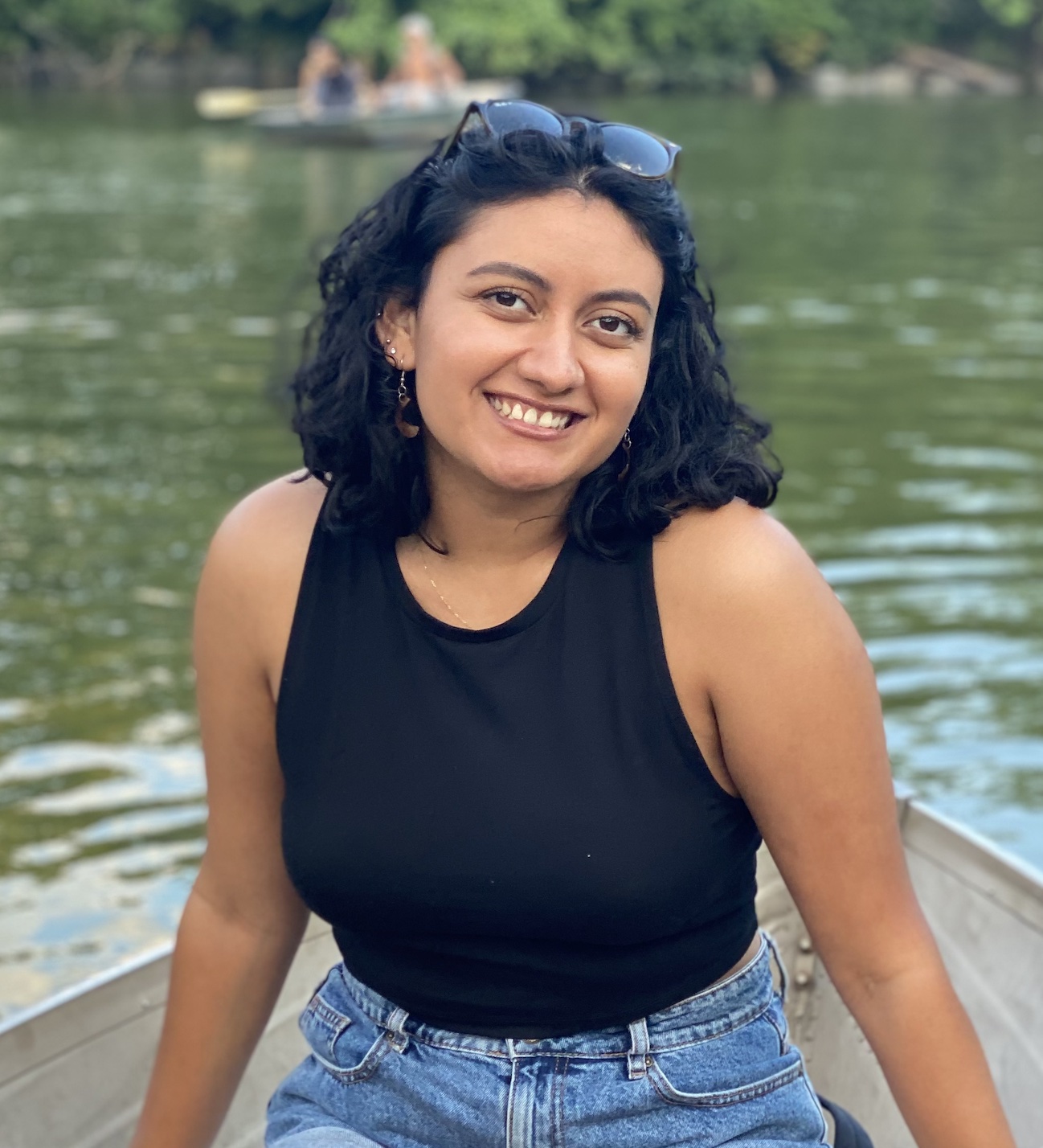 Stephanie Rosa also joined the Center for Health Equity in the fall of 2021 through the CDC Public Health Associate Program. She received a BA in Public Health from the University of California, Berkeley. During her time at Berkeley, Stephanie led programs focused on addressing health disparities, primarily in the county of Los Angeles, California. She is excited to be working with CHE and continue her work to strive for equity amongst underserved populations. Stephanie has been supporting the Eliminating Health Disparities Initiative through a grant manager role. Welcome Stephanie!
Stephanie Rosa also joined the Center for Health Equity in the fall of 2021 through the CDC Public Health Associate Program. She received a BA in Public Health from the University of California, Berkeley. During her time at Berkeley, Stephanie led programs focused on addressing health disparities, primarily in the county of Los Angeles, California. She is excited to be working with CHE and continue her work to strive for equity amongst underserved populations. Stephanie has been supporting the Eliminating Health Disparities Initiative through a grant manager role. Welcome Stephanie!
Here at the Center for Health Equity, our work has been heavily focused on COVID-19 management and vaccine efforts, while also maintaining our grant programs and advisory councils.
Interested in being a guest writer for a future newsletter?
Email your idea to health.equity@state.mn.us and we will be in touch!
Message from the Director
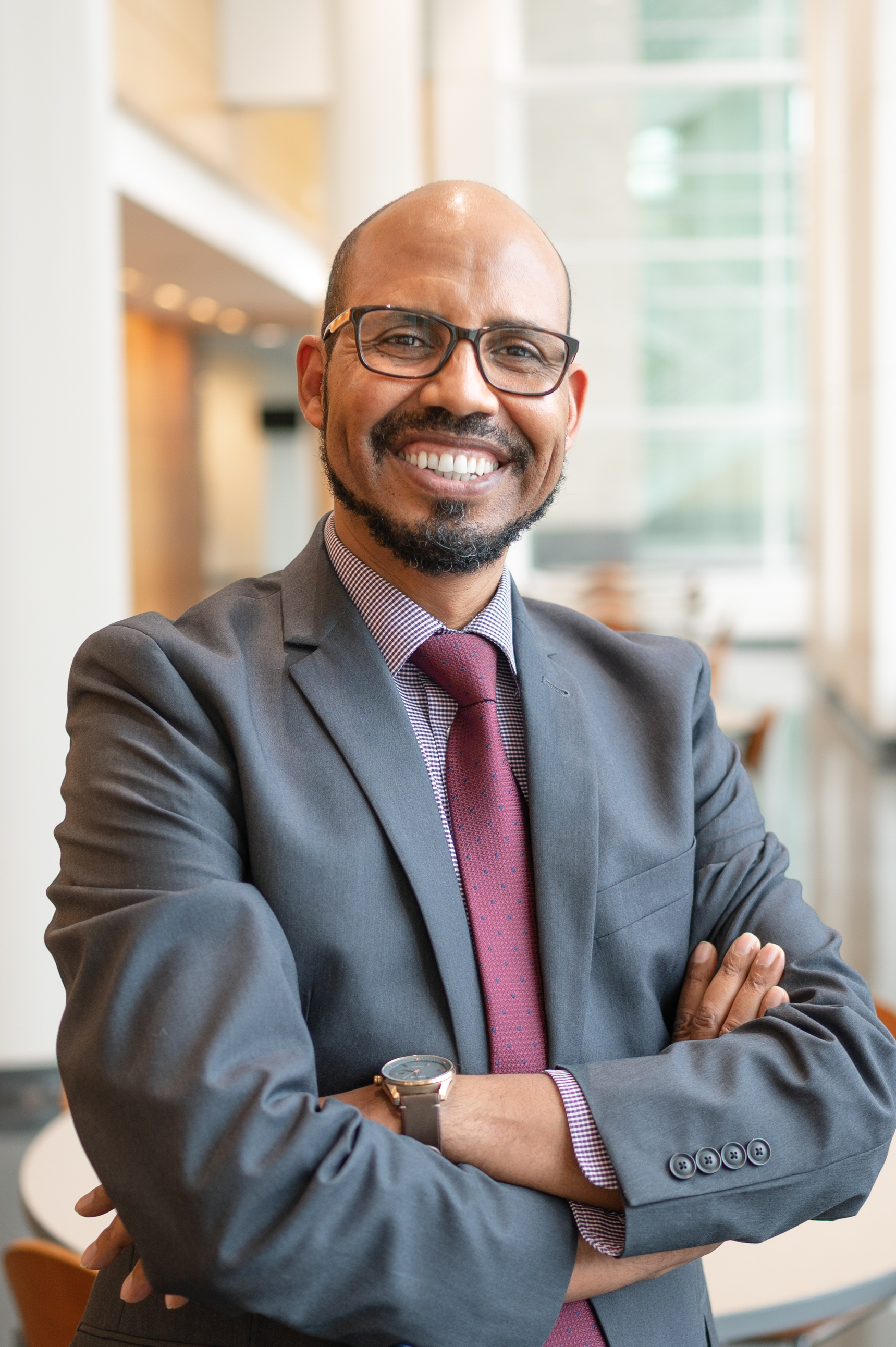 It has been five weeks since I joined MDH as the Director for the Center for Health Equity. During this time, I have met with MDH staff, community stakeholders, local public health leaders, grantees, and health systems. I am amazed by the depth and breadth of health equity work here at MDH and across the state of Minnesota. I am thrilled to be among these energetic and passionate individuals and organizations building a movement for health equity both within MDH and across the great state of Minnesota.
It has been five weeks since I joined MDH as the Director for the Center for Health Equity. During this time, I have met with MDH staff, community stakeholders, local public health leaders, grantees, and health systems. I am amazed by the depth and breadth of health equity work here at MDH and across the state of Minnesota. I am thrilled to be among these energetic and passionate individuals and organizations building a movement for health equity both within MDH and across the great state of Minnesota.
I am immensely grateful for the incredible work you all have done thus far during this trying time of our lives. I am also mindful of the work we still need to do to advance health equity for communities most impacted by inequities.
COVID-19 not only has exacerbated these existing inequities but also taught us to work differently and at a different scale to address these inequities. The key lessons I have learned through our approaches to the COVID-19 response, is that health equity work is done best by building a movement, transforming the system of inequity, and creating a sense of belonging in a community.
The pandemic has widened the divide in our community. We live in a seemingly very connected world but with limited or non-existent connections with “other” people, which leads us to hold uninformed narratives and beliefs about the “other.” These uninformed narratives we hold about “other” people—in most cases—are malignant and pervasive in health as they place the burden of responsibility for both harm and repair on oppressed populations. Thus, health equity efforts must focus on addressing the causes of causes— discriminatory and dehumanizing laws and policies, uninformed dominant narratives, and systems (i.e., structural, and racial). The inequities our community face is rooted in long-standing, complex systems that need all of us, from different backgrounds, to build a movement and work together to change them. It requires a shift from the traditional collective impact approach to building a movement that aims to transform systems by amplifying community-based efforts and community voices to build a vision of the future based on common values and narratives.
Transforming the systems that structure opportunities by race, gender identity, sexual orientation, disability status, and place of residence entails building a sense of belonging in a community that transcends inclusion and diversity. Belonging is more than just being included or having access to resources or healthcare; it is having a meaningful voice and equitable opportunity to design all the political, social, economic, and cultural structures that affect one’s life and undermine the community’s ability to thrive. It also includes having the right to both contribute and make demands upon society and institutions. The concept of creating a sense of belonging in a community is rooted in the belief that everyone has stories, ideas, and experiences that can contribute meaningfully to the improvement of our community. One way to create a sense of belonging is by seeking authentic community engagement. My vision for the MDH’s Center for Health Equity is to become the Center that brings an unexpected combination of people together to transform systems and build a healthier and more equitable Minnesota for all Minnesotans. I aspire to see the diverse voices of our community drive MDH’s decision-making and move our agency toward making meaningful change in the lives of historically marginalized and minoritized groups of our community.
As I embark on this new role, I ask you all for your support, input, and collaboration. Please stay tuned for more information as we lay out the next strategic directions to connect, strengthen and amplify health equity efforts within MDH and across the great state of Minnesota. Thank you for your partnership, dedication to transforming the system of inequity, and your commitment to creating a sense of belonging in a community to ensure none of our communities are left behind.
Dr. Halkeno Tura
Director, Center for Health Equity
CONNECT
We are a network hub – leading, connecting and strengthening networks of health equity leaders and partners across MDH and Minnesota communities.
Eliminating Health Disparities Initiative Grantees virtually connect at Fall Gathering
November 9th marked the first session of a two-part virtual grantee gathering for the Eliminating Health Disparities Initiative (EHDI) grant program. This was the first gathering in Year 3 of the four-year program. It provided an opportunity for new grant and program staff to introduce themselves to each other. Other grant management reminders were shared in support of grantees’ success.
The gathering gave the grantees an opportunity to listen to new Center for Health Equity Director, Dr. Halkeno Tura, and hear him share about his vision for the Center. This included highlighting how focusing on system transformation and authentic community engagement would enhance health equity efforts across the state of Minnesota. Programs like EHDI, COVID Community Coordinators, and the COVID-19 Cultural, Faith, and Disabilities branch further equity work across the agency by using a bold approach to addressing racism. Moving forward, Dr. Tura outlined a focus on belonging, as that will strengthen populations to become co-creators and co-producers, along with identifying intersectionality in community. Investing in these initiatives and grantees, like those in EHDI, build this movement towards ongoing, authentic community engagement and create that sense of belonging.
In addition, Dr. Halkeno and Sara Chute, Assistant Director at the Center for Health Equity, held a Question & Answer Session with grantees. This discussion reinforced the Center for Health Equity’s work in supporting communities through systems changes along with adaptations made due to the COVID-19 pandemic.
With over 60 in attendance, grantees had the opportunity to speak with staff from the Center of Health Equity in several breakout rooms. Since the gathering was held virtually, these rooms offered opportunities for staff and grantees to engage in a more intimate setting. The small groups answered many entertaining prompts like favorite winter activity, new hobbies, changing career paths, learning experiences, and grounding memories created by partner staff at Rainbow Research. This World Café activity allowed new staff to start conversations with grantees and aimed to deepen relationships amongst the cohort.
The next part of the 2021 Virtual Fall Grantee Gathering, known as a Community of Practice, will share the information submitted by grantees in Year 2 Annual Reports. The Shared Measurement System metrics formulated by Center for Health Equity staff in partnership with Rainbow Research will showcase grantee successes and celebrate their accomplishments in this challenging year.
STRENGTHEN
We provide leadership in advancing health equity and cultivate health equity leaders within MDH and across Minnesota communities.
This article is part of a series of stories about community outreach and partnership in response to the COVID-19 pandemic. Learn more and find more stories on the COVID-19 Stories of Community Outreach and Partnership page.
Uniting Against COVID-19: A Unique Public Housing Collaboration for Vaccinating Community
Bringing Vaccines to the Community
COVID-19 may have called for social distancing, but it certainly couldn’t keep community collaboration and partnerships from thriving. In summer of 2020, when COVID-19 cases were just beginning to rise, Hennepin County partnered with Volunteers of America to conduct COVID-19 testing and provide health education on COVID-19 safety precautions to the residents in Minneapolis public housing complexes. The testing model utilized by Hennepin County and Volunteers of America was highly successful, and when the Minneapolis Health Department identified residents of Minneapolis Public Housing complexes as a priority population for COVID-19 vaccinations, they knew they had an effective model to build upon.
The Minneapolis Public Housing Authority (MPHA) serves residents in Minneapolis to ensure that they have a place to call home. Residents of public housing make up a vibrant community of families, older adults, and people with disabilities from all ethnic, cultural, and community groups. However, as MPHA’s Director of Housing Choice Vouchers Kyle Hanson described, many factors such as close quarters, limited health literacy, and lower-income created an environment that put the residents at a higher risk of getting COVID-19.
As soon as COVID-19 vaccines were available in Minnesota, the Minneapolis Health Department partnered with MPHA, Volunteers of America, the Minnesota Department of Health, and COVID Community Coordinators — community-based organizations contracted by MDH to connect Minnesota’s diverse communities to COVID testing, vaccination, and other resources – to bring COVID-19 vaccines to 39 high-rise apartment complexes. Lara Pratt, Minneapolis Health Department’s senior public health specialist on the Healthy Living Team, worked closely with MDH’s African Community Liaison team to connect with partners and community organizations to make these vaccination events a success. Pratt stressed that while the Minneapolis Health Department convened and coordinated the effort, the vaccination events would not have taken place without “leveraging the best of what each entity could bring.”
Playing to each organization's strengths
As Bill Melton and many of his team members from Volunteers of America emphasized, “Without everyone working together, the events would not have come together.” MPHA jump-started the efforts by sending all residents a package of information letting them know COVID-19 vaccines would be available. The package contained a registration form as well as a postcard for residents to send back to MPHA and let them know if they had already been vaccinated, were interested in getting vaccinated, or needed more information. From there, the Minneapolis Health Department, MPHA, and the MDH African Community Liaison team drew on their deep knowledge of the community to coordinate with COVID Community Coordinators and Volunteers of America for door-knocking and engagement activities.
Volunteers of America led the engagement and outreach because of their long-standing relationships with residents in public housing. For Volunteers of America leads Bill Melton and Rhonda Peterson, they “lived and breathed” this project for several months. Using a trauma-informed lens, staff called all interested apartment residents beforehand to notify them that COVID Community Coordinators and Volunteers of America staff would be door-knocking and answering vaccination questions in the community room, and then participated in the actual door-knocking and vaccination events in 39 different apartment complexes.
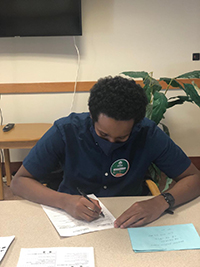 A week before the vaccination events at each of the respective apartment complexes, Volunteers of America and COVID Community Coordinator staff went door-to-door and helped register residents who were interested in getting their COVID-19 vaccine. They also set up a table at each apartment complexes’ community room to answer questions. The COVID Community Coordinators involved in the efforts included the Islamic Association of North America, African Immigrant Community Services, WellShare International, Tserha Aryam Kidist Selassie, CAPI USA, Phyllis Wheatley Community Center, and the Somali Medical Association of American Physicians. Holding diverse intersectional identities across race, gender, sexuality, and disability status, the Volunteers of America staff and COVID Community Coordinators were able to provide appropriate language support and be trusted liaisons to the residents using their expertise on community norms and approaching all residents with cultural and religious sensitivity.
A week before the vaccination events at each of the respective apartment complexes, Volunteers of America and COVID Community Coordinator staff went door-to-door and helped register residents who were interested in getting their COVID-19 vaccine. They also set up a table at each apartment complexes’ community room to answer questions. The COVID Community Coordinators involved in the efforts included the Islamic Association of North America, African Immigrant Community Services, WellShare International, Tserha Aryam Kidist Selassie, CAPI USA, Phyllis Wheatley Community Center, and the Somali Medical Association of American Physicians. Holding diverse intersectional identities across race, gender, sexuality, and disability status, the Volunteers of America staff and COVID Community Coordinators were able to provide appropriate language support and be trusted liaisons to the residents using their expertise on community norms and approaching all residents with cultural and religious sensitivity.
Throughout the whole vaccination process, the Minneapolis Health Department coordinated all the partners to staff the events and provided day-of coordination, as well as the COVID-19 vaccines and nurses to help administer the vaccines. The health department contracted Hennepin Healthcare to give residents the vaccine, and Pratt noted that the nurses were “fabulous and performed incredible work on a tight timeline.” Minnesota Department of Health COVID Community Coordinator Lead Aisha Galaydh, who helped spearhead the idea, was “amazed to see everyone coming together and being willing to do the hard work [of door-knocking].” For her, it was a “small idea that quickly grew into a big effort,” and she was “grateful to that everyone had the same goal [of vaccinating the community].”
Overcoming Challenges
The collective vaccine team faced many challenges in vaccinating residents in 39 high-rise apartment complexes. Pratt noted that “There was a real urgency to get this done as quickly as possible. And some days, they would have four or five building vaccination events going on at the same time, making staffing a challenge.” She credits the Minneapolis Health Department, who served as the site lead at each building for coordinating the process, and Hennepin Healthcare with providing enough staff to give residents vaccines. Without them, the “vaccination process would have dragged out” and left vulnerable residents unprotected. One challenge brought up by everyone involved was addressing misinformation, and in some cases, figuring out what the misinformation was before they could even address it. For instance, many residents believed that this was not a vaccination event, but a ploy to give all residents COVID-19. It was not until the team overheard this from residents that they were able to soothe their fears. The COVID Community Coordinators and Volunteers of America staff helped address misinformation and increased vaccine confidence in all 39 apartment complexes. They also worked with the Somali Medical Association of American Physicians to address questions on the vaccine and its side effects and to provide accurate COVID-19 information.
Vaccination Impact on the Community, a Successful Endeavor
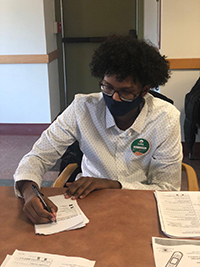 One mission brought all the partners together – bringing vaccines to the community. While some residents were more hesitant about opening their doors, other residents, particularly the older adults, were grateful for the connection to help alleviate social isolation and get the vaccine. African Immigrant Community Services staff shared that some residents offered tea, coffee, and cookies for coming in to talk and give information. With everyone’s combined efforts, 1,627 residents and staff were vaccinated and 93% of residents who were vaccinated came back for their second dose, “an amazing second dose rate” according to Pratt. While the vaccination events were incredibly successful, Hafsa Ali, one of MDH’s African Community Liaisons, believes that “the impact of reaching out to the community is more than the number vaccinated.” Without a doubt, the vaccination events would not have been successful without the combination of strengths brought by Minneapolis Health Department, MPHA, Hennepin Healthcare, Volunteers of America, and MDH’s COVID Community Coordinators and each organization’s care for the community.
One mission brought all the partners together – bringing vaccines to the community. While some residents were more hesitant about opening their doors, other residents, particularly the older adults, were grateful for the connection to help alleviate social isolation and get the vaccine. African Immigrant Community Services staff shared that some residents offered tea, coffee, and cookies for coming in to talk and give information. With everyone’s combined efforts, 1,627 residents and staff were vaccinated and 93% of residents who were vaccinated came back for their second dose, “an amazing second dose rate” according to Pratt. While the vaccination events were incredibly successful, Hafsa Ali, one of MDH’s African Community Liaisons, believes that “the impact of reaching out to the community is more than the number vaccinated.” Without a doubt, the vaccination events would not have been successful without the combination of strengths brought by Minneapolis Health Department, MPHA, Hennepin Healthcare, Volunteers of America, and MDH’s COVID Community Coordinators and each organization’s care for the community.
Special Thanks
This story would not have been possible without the teams from Volunteers of America, Minneapolis Public Health, MPHA, and MDH’s COVID Community Coordinators taking their time to share information on this incredible vaccination effort. A huge thank you to:
Minneapolis Public Housing Authority
Kyle Hanson
Minneapolis Health Department
Lara Pratt
MDH COVID-19 Community Coordinators
Luqman Mohamed, Dr. Tedla, Hannah Sharaf, Hodan Abdi, Paul Andrighetti, Joanna Schlegelmilch, Mohamed Khalif, Sakhaudiin Mohamud, Abdiqafar Jama
Volunteers of America
Bill Melton, Heather Wengerd, Rhonda Peterson, Scott Fridley, Carrie Harris, Terri Trombley, Jessica Kuenzli, Dega Ali, Gregg Lowe, Cheetara McKinley, Rebekah Floyd, Ahmed Bani, Arefat Musa, Osob Aden, Mahdi Nur, Daniel Monserud
AMPLIFY
We amplify the work of communities most impacted by health inequities and support them to drive their own solutions.
This article is part of a series of stories about community outreach and partnership in response to the COVID-19 pandemic. Learn more and find more stories on the COVID-19 Stories of Community Outreach and Partnership page.
Phyllis Wheatley: A cornerstone for COVID-19 support in the community
Since its founding, Phyllis Wheatley Community Center has been a safe haven for the African American community. African American civic leaders, educators, entertainers, and students have walked through the organization’s door to this home-away-from-home. Today, Phyllis Wheatley continues to provide education and skill-building opportunities to help people and families in the African American community. When the COVID-19 pandemic started, Phyllis Wheatley knew that it would be a cornerstone during the COVID-19 response due to its longstanding relationship with the community.
For nearly a year now, the Minnesota Department of Health (MDH) has partnered with Phyllis Wheatley to create and share culturally relevant COVID-19 education messages and materials and connect community members to needed resources within the African American community—one of the communities most impacted by COVID-19, inequities, and systemic racism. Joanna Schlegelmilch, the lead at Phyllis Wheatley on their COVID-19 Community Coordinator (CCC) contract with MDH, noted that the area of North Minneapolis served by the organization was one hit hard by COVID-19.
A Constant Cornerstone of Support
At the beginning of the pandemic, Phyllis Wheatley started hosting testing events as well as connecting community members with basic resources such as housing and food assistance through its COVID-19 Hotline as part of the CCC initiative. In 2021, when COVID-19 vaccines were more plentiful, Phyllis Wheatley transitioned to supporting vaccination clinics. They registered community members for vaccination or helped them find accessible locations to get vaccinated.
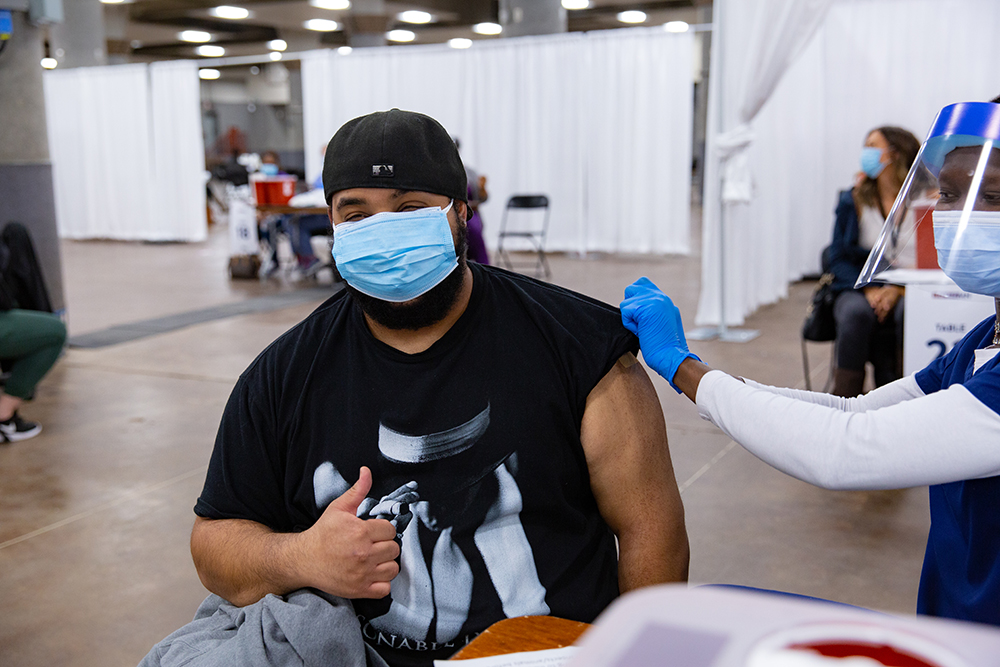
Through community engagement and outreach, Phyllis Wheatley staff heard whispers that misinformation was spreading in the community. In order to better understand the misinformation and have an opportunity to correct it, Phyllis Wheatley expanded its COVID-19 operations from their hotline number to also include door-knocking. Schlegelmilch explained the addition, saying they had to “make sure to have a conversation around the vaccine, to make sure [people] were able to make an informed decision.”
Door-knocking provided the opportunity to directly engage with the community, proving especially important for community members without access to technology. Technology challenges were “a massive barrier,” recalled Schlegelmilch, and “many were not able to access assistance.” With Phyllis Wheatley’s new community engagement strategy, outreach specialist teams went door-to-door through the neighborhood and sat down with community members, sometimes “on their front porch, and helped them fill out the forms.” The outreach specialist teams would then provide contact information to their hotline if food or housing support was also needed, and hotline teams would follow up. This new system helped many community members overcome the technology barriers that were exacerbated by COVID-19.
Success in Partnership and Community
Through the pandemic, Phyllis Wheatley has been able to shift projects to meet people where they are at. “People are dealing with more immediate crises,” said Schlegelmilch. As such, the organization’s top priority has been to help people access housing or food support in addition to COIVD-19 testing and vaccination. Phyllis Wheatley has leaned on its partnerships with other community organizations to make sure that they are showing up for the community in the way the community needs. It currently collaborates with The Power of People Leadership Institute and Second Chance Coalition to help increase vaccine confidence. Schlegelmilch also mentioned that working with MDH has been “wonderful and MDH [has been] very responsive to all their needs.”
Yet some challenges, remain with community engagement. Schlegelmilch notes that “it has been difficult to [carry out] because of gun violence and general violence in the neighborhoods,” making it more difficult to go door-knocking and reach community members in their neighborhoods. Staff continue to engage with the community when they are able, as Phyllis Wheatley has seen the difference that this form of community outreach makes.
Down the Road with COVID-19
Phyllis Wheatley knows that COVID-19 is not over, and for their community, getting people vaccinated and continuing education on masking and testing is still a priority. As of September 2021, a little over half of the Black and African American community over 12 years of age are fully vaccinated, leaving a significant part of the community unprotected. Phyllis Wheatley is in the process of setting up recurring vaccination and testing events so that community members know they can show up and walk in for either a vaccination or COVID-19 test at regular times. Two exciting projects that Phyllis Wheatley has been looking into are new “mobile vaccine teams where medical teams go out to community events” and sending COVID-19 test kits home with kids at school to get the whole family tested for COVID-19. Phyllis Wheatley continues to prioritize meeting people where they are at and removing as many barriers to COVID-19 testing and vaccination as they can.